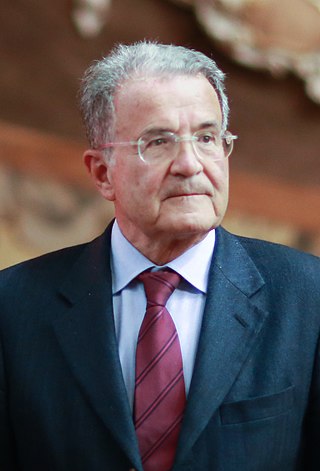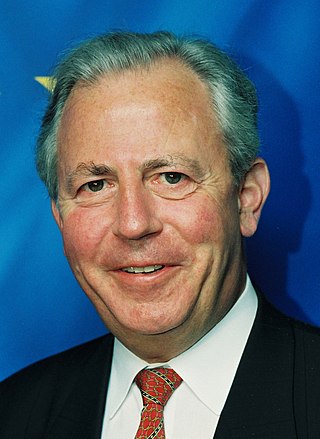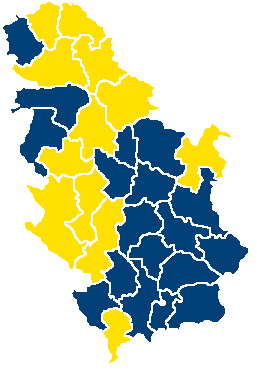| |||||
| Decades: | |||||
|---|---|---|---|---|---|
| See also: | |||||
Events from the year 1999 in the European Union .
| |||||
| Decades: | |||||
|---|---|---|---|---|---|
| See also: | |||||
Events from the year 1999 in the European Union .

The European Commission (EC) is part of the executive of the European Union (EU), together with the European Council. It operates as a cabinet government, with 27 members of the Commission headed by a President. It includes an administrative body of about 32,000 European civil servants. The Commission is divided into departments known as Directorates-General (DGs) that can be likened to departments or ministries each headed by a Director-General who is responsible to a Commissioner.

The president of the European Commission is the head of the European Commission, the executive branch of the European Union (EU). The President of the Commission leads a Cabinet of Commissioners, referred to as the College, collectively accountable to the European Parliament. The President is empowered to allocate portfolios among, reshuffle, or dismiss Commissioners as necessary. The College directs the Commission's civil service, sets the policy agenda and determines the legislative proposals it produces. The Commission is the only body that can propose bills to become EU laws.

The European Union is a geo-political entity covering a large portion of the European continent. It is founded upon numerous treaties and has undergone expansions and secessions that have taken it from six member states to 27, a majority of the states in Europe.

Romano Prodi is an Italian politician, economist, academic, senior civil servant, and business executive who served as the tenth president of the European Commission from 1999 to 2004. He served twice as Prime Minister of Italy, first from 18 May 1996 to 21 October 1998, and then from 17 May 2006 to 8 May 2008. Prodi is considered the founder of the Italian centre-left and one of the most prominent and iconic figures of the so-called Second Republic. He is often nicknamed Il Professore due to his academic career.

Wolfgang Schüssel is an Austrian politician. He was Chancellor of Austria for two consecutive terms from February 2000 to January 2007. While being recognised as a rare example of an active reformer in contemporary Austrian politics, his governments were also highly controversial from the beginning, starting with the fact that he formed a coalition government with Jörg Haider's Freedom Party of Austria (FPÖ) on both occasions. In 2011, he retired from being an active member of parliament due to a multitude of charges of corruption against members of his governments.

A European Commissioner is a member of the 27-member European Commission. Each member within the Commission holds a specific portfolio. The commission is led by the President of the European Commission. In simple terms they are the equivalent of government ministers.

The Santer Commission was the European Commission in office between 23 January 1995 and 15 March 1999. The administration was led by Jacques Santer.

The institutions of the European Union are the seven principal decision-making bodies of the European Union and the Euratom. They are, as listed in Article 13 of the Treaty on European Union:

The Prodi Commission was the European Commission in office between 1999 and 2004. The administration was led by former Italian Prime Minister Romano Prodi.

Manuel Marín González was a Spanish politician, former President of the Congress of Deputies of Spain. He was a long-time member of the European Commission, and acting president during the Santer Commission following the resignation of Jacques Santer. He is considered the father of the Erasmus Programme.

The official title President of the European Union does not exist, but there are a number of presidents of European Union institutions, including:

Presidential elections were held in Serbia on January 20 and February 3, 2008. Incumbent President Boris Tadić was re-elected as president in the second round with 51% of the vote, defeating challenger Tomislav Nikolić.
Events in the year 1994 in the European Union.
Events from the year 1998 in the European Union.

The history of the European Union between 1993 and 2004 was the period between its creation and the 2004 enlargement. The European Union was created at the dawn of the post–Cold War era and saw a series of successive treaties laying the ground for the euro, foreign policy and future enlargement. Three new member states joined the previous twelve in this period and the European Economic Area extended the reach of the EU's markets to three more.
Events from the year 1996 in the European Union.
Events in the year 1995 in the European Union.

The Freedom Party of Austria is a national-conservative and right-wing populist political party in Austria. It was led by Norbert Hofer from September 2019 to 1 June 2021. It is the third largest of five parties in the National Council, with 30 of the 183 seats, and won 16.2% of votes cast in the 2019 legislative election. It is represented in all nine state legislatures, and a member of two state cabinets. On a European level, the FPÖ is a founding member of the Identity and Democracy Party and its three Members of the European Parliament (MEPs) sit with the Identity and Democracy (ID) group.

The European act of state in honour of Helmut Kohl was an act of state to honour former German Chancellor Helmut Kohl following his death, and took place at the European Parliament in Strasbourg, France on 1 July 2017 from 11 AM to 1 PM. It was announced by the European Commission on 18 June 2017, and was the first European act of state in the history of the European Union. It was co-organised by the European Commission, the European Parliament and the European Council.